|
|
|
Sort Order |
|
|
|
Items / Page
|
|
|
|
|
|
|
| Srl | Item |
| 1 |
ID:
148151
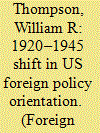

|
|
|
|
|
| Summary/Abstract |
Grand strategy change analyses exhibit problems in balancing the interaction among ideas, external structures and developments, and domestic politics. An alternative theory is constructed that combines the correspondence between external problems and capability, shocks, political entrepreneurship, domestic politics, and reinforcement. The essence of the theory is that strategic shifts are more probable and likely to persist to the extent that more of these components involve significant changes. The 1920–1945 system leader puzzle – why the United States abstained from ascending to the system leader position in 1920 but not in 1945 – is used as an illustration of the theory's explanatory utility.
|
|
|
|
|
|
|
|
|
|
|
|
|
|
|
|
| 2 |
ID:
166148
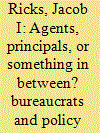

|
|
|
|
|
| Summary/Abstract |
In the aftermath of the 2006 and 2014 Thai coups, observers declared the resurrection of the bureaucratic polity. Bureaucrats, though, remained influential even during the period of 1992–2006, when elected politicians were thought to command the Thai state. Bureaucratic involvement in politics poses a challenge for dominant political science theories of politician–bureaucrat relationships, which draw heavily from principal–agent frameworks. I apply agency theory to Thailand, testing three different hypotheses derived from the theory. Examining legislative productivity and control over bureaucratic career trajectories, I find that elected politicians increasingly acted as principals of the Thai state from 1992 through 2006, and to a lesser degree from 2008 to 2013. Thai bureaucrats, though, have frequently engaged in the political sphere, blunting political oversight and expanding their independence vis-à-vis politicians. This suggests that the principal–agent model overlooks the range of resources that bureaucracies can bring to bear in developing countries, granting them greater autonomy than anticipated. As such, theories of the politician–bureaucrat relationship in developing states need to better account for the mechanisms through which bureaucrats exercise policy discretion and political influence.
|
|
|
|
|
|
|
|
|
|
|
|
|
|
|
|
| 3 |
ID:
167578
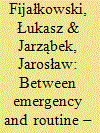

|
|
|
|
|
| Summary/Abstract |
The aim of this article is to explain the internal conditions of military security in a non-European context. It utilises securitisation as the theoretical perspective and investigates Iranian and Indonesian case studies to explore how the perception of internal threats and vulnerabilities determines the approaches to military security. It begins with a reiteration of securitisation theory assumptions, followed by clarifying the understanding of security in non-Western contexts. The case studies focus on the conditions which facilitate securitisation, including the nature of securitising actors, assumed concepts of security, and securitisation processes and their outcomes. The analysis indicates a necessity for several alterations in securitisation theory to realise its full potential. Civil–military relations in Asian states differ from those in the West, as both Iran and Indonesia show a high degree of military involvement in political affairs. Military security also becomes securitised as a result of internal political rivalries. The perception of threats is a tool in the struggle to extend the capabilities of security agencies or retain influences.
|
|
|
|
|
|
|
|
|
|
|
|
|
|
|
|
| 4 |
ID:
103725
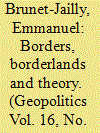

|
|
|
| 5 |
ID:
160050
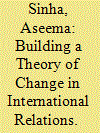

|
|
|
|
|
| Summary/Abstract |
Fundamental transformations in the distribution of power among nations have re-focused the attention of the International Relations (IR) subfield on how to understand change and power transitions. I add to this larger literature by presenting a typology of change drawn from comparative politics that incorporates attention to incremental or slow moving change, and path-dependence as a theoretical tool to explain discontinuous change such as wars, and the fall of the former Soviet Union. I offer a distinction between process of change and its outcome. Change may be incremental or disruptive and could lead to continuity with existing institutions or their transformation. This typology allows us to explore the process of change and develop theories of change in a new way. In essence, I argue for broadening our conceptions of change to account for endogenous sources of change (internal to the system), and incremental yet significant change.
|
|
|
|
|
|
|
|
|
|
|
|
|
|
|
|
| 6 |
ID:
071463
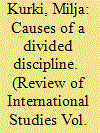

|
|
|
| 7 |
ID:
146895
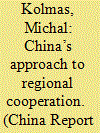

|
|
|
|
|
| Summary/Abstract |
China’s rise has inspired a variety of interpretations arguing for either its potentially disruptive or alternatively its benign impact on Asia–Pacific security. This article aims to contribute to this debate. It focuses on the upsurge in Beijing’s multilateral diplomacy since the beginning of the 1990s, which has been reflected in China’s willingness to take part in many regional institutions, such as Shanghai Cooperation Organization (SCO), the Six Party Talks (6PT), East Asia Summit (EAS) or Asia Pacific Economic Cooperation (APEC). But what are China’s motivations for participation in these institutions? Are they instrumental, driven by pragmatic self-interest, or moral, driven by normative values of peace? Or, has China merely accepted the need to play a socially ‘appropriate’ role within the region? The article offers a theoretically informed typology of the different kinds of motivation that can explain China’s multilateral diplomacy in the last three decades. It argues that whereas social motivation played a decisive part in the first phase of China’s multilateralism, instrumental motivation can be seen as defining the more recent phase.
|
|
|
|
|
|
|
|
|
|
|
|
|
|
|
|
| 8 |
ID:
143779
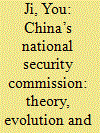

|
|
|
|
|
| Summary/Abstract |
The establishment of the National Security Commission (NSC) of the Chinese Communist Party (CCP) is a major regrouping of the top CCP power structure, a ‘New Deal’ in Xi Jinping’s endeavor to revitalize China. In full operation it will reshape Beijing’s national security (NS) decision-making process concerning the formulation of national security strategies, crisis management at home and abroad, coordination of national security policies and actions by Party/army/state agencies and institutional links with its foreign national security counterparts. This article argues that the NSC will primarily address the Party’s internal security concerns, which is the key link to its efforts to strike a new balance between various security typologies. It analyses Beijing’s securitization guidance and practice and constructs its organizational structure and functions.
|
|
|
|
|
|
|
|
|
|
|
|
|
|
|
|
| 9 |
ID:
074369
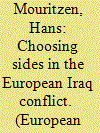

|
|
|
|
|
| Publication |
2006.
|
| Summary/Abstract |
Focusing on the Euro-Atlantic conflict over the Iraq war operation in early 2003 (the 'European Iraq conflict'), the purpose of the present article is to explain the pattern of Atlantic (vs. Continental) predispositions among European countries. It argues that this is the best suited conflict in the post-Cold War era to illuminate this stable and fundamental pattern. Whereas systemic power distribution, size, public opinion, or government ideology all fail to account for the positioning of states in the conflict (and balance of threat applies only modestly), a theory of 'past and present geopolitics' is outlined that seems able to explain states' predispositions and, hence, their positionings in this specific situation. It is remarkable that 'old-fashioned' geopolitical dynamics can be identified even within the Euro-Atlantic zone of 'peace and prosperity'-not only at its fringes, but also in its very heart.
|
|
|
|
|
|
|
|
|
|
|
|
|
|
|
|
| 10 |
ID:
072631


|
|
|
|
|
| Publication |
2006.
|
| Summary/Abstract |
This essay presents a theory of small arms demand and provides initial evidence from ongoing case studies in the Solomon Islands, Papua New Guinea, South Africa and Brazil. The theory revolves around the motivations and means to acquire arms, addressing issues such as contrasting acquirers and possessors and differentiating between acquirers and non-acquirers, consumers and producers, and final and intermediate demand. The essay also studies characteristics of small arms that make them so desirable as compared to other means of conducting violent conflict. The overall goal is to provide a theoretical framework and language that is common to a variety of social science approaches to the study of small arms use, misuse and abuse.
|
|
|
|
|
|
|
|
|
|
|
|
|
|
|
|
| 11 |
ID:
178616
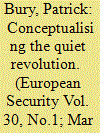

|
|
|
|
|
| Summary/Abstract |
There is growing evidence that simultaneous to the Revolution in Military Affairs (RMA), a less obvious, but equally profound, Revolution in Military Logistics (RML) has occurred that shapes and underpins western military effectiveness. However, there has been no conceptualisation of this RML nor its wider effect on Western force structures. This article addresses this gap in the security literature. Using an interdisciplinary literature review and case studies, it makes two central contributions: first, it details how western military logistics systems and practises have transformed following post-Fordist principles in the last two decades. In doing so, second, it contributes a major new conceptual framework to the military logistics and security studies literature. Finally, the implications of these processes for military effectiveness are examined, with the conclusion asserting that the cumulative effect of this post-Fordist RML has potentially increased western militaries’ strategic vulnerability.
|
|
|
|
|
|
|
|
|
|
|
|
|
|
|
|
| 12 |
ID:
055792
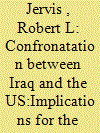

|
|
|
| 13 |
ID:
091756
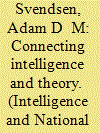

|
|
|
|
|
| Publication |
2009.
|
| Summary/Abstract |
Intelligence liaison increased exponentially during the so-called 'War on Terror'. Today it continues as the most significant dimension of intelligence, including impacting on accountability and oversight considerations. Nevertheless, the intelligence liaison phenomenon remains largely under-studied and substantially under-theorized. In this article, preliminary suggestions are offered concerning how this dearth of theory can be addressed. Firstly, the relevance of international relations theory and other bodies of theory, together with significant approaches concerning how international relations - extending to how intelligence and intelligence-related phenomena (such as, in this article, intelligence co-operation) - can be studied, are explored. These theories, and equally, approaches, are arguably most appropriate when deployed in an arrangement of 'complex co-existence plurality' across the different interrelated levels of experience and analysis, and they offer more effective explanations when intelligence liaison is disaggregated into at least eight systemic attributes or variables. More broadly, the suggestion that international relations theory, and indeed theory generally, is 'irrelevant' to intelligence studies is simultaneously challenged.
|
|
|
|
|
|
|
|
|
|
|
|
|
|
|
|
| 14 |
ID:
114677
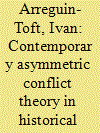

|
|
|
|
|
| Publication |
2012.
|
| Summary/Abstract |
This article offers an intellectual history of theoretical work devoted to explaining asymmetric conflict outcomes since World War II. Three factors are critical to understanding how the literature has evolved. First, the concept of "asymmetric conflict" encompasses a number of overlapping literatures, including insurgency, terrorism, counterinsurgency, and most recently, civil wars. Second, and interrelated, the field of inquiry has been unproductively divided between military and academic thinkers, with insufficient engagement between the two communities. Third, the popularity of the field of inquiry following the events of September 11, 2001, and the subsequent American-led military operations in Afghanistan (2001) and Iraq (2003) have resulted in analyses that are empirically rich, but have provided little in the way of theoretical advances. The conclusion offers an overall assessment of the field of inquiry into asymmetric conflict outcomes, suggested directions for future research, and a table of major contributors to the literature, their key questions, case universes, intended contributions, and theoretical limitations.
|
|
|
|
|
|
|
|
|
|
|
|
|
|
|
|
| 15 |
ID:
069800
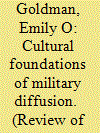

|
|
|
| 16 |
ID:
075325
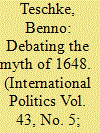

|
|
|
|
|
| Publication |
2006.
|
| Summary/Abstract |
This rejoinder restates and develops the central theses of 'The Myth of 1648: Class, Geopolitics and the Making of Modern International Relations' in relation to a set of objections raised from the perspective of IR Historical Sociology by Hendrik Spruyt, of Political and Social Theory by Roland Axtmann and of Political Geography by John Agnew. Most centrally, it re-affirms the charge of a defective historicisation and theorisation of 'Westphalia' in the discipline of International Relations, while suggesting that a Marxist perspective that emphasises the spatio-temporally differentiated and geopolitically mediated development of Europe is capable of providing a new long-term interpretive framework for the complex co-development of capitalism, state building and the interstate system. It thereby pleads for a paradigm-shift in IR Theory and IR Historical Sociology.
|
|
|
|
|
|
|
|
|
|
|
|
|
|
|
|
| 17 |
ID:
074265
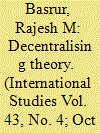

|
|
|
| 18 |
ID:
073549
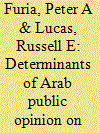

|
|
|
|
|
| Publication |
2006.
|
| Summary/Abstract |
Using Zogby International polling data from seven different Arab nations (Egypt, Jordan, Kuwait, Lebanon, Morocco, Saudi Arabia, and the United Arab Emirates) this paper offers a societal-level quantitative analysis (N=91 dyads) of the determinants of Arab public opinion toward 13 different non-Arab countries (Canada, China, France, Germany, India, Iran, Israel, Japan, Pakistan, Russia, Turkey, the United Kingdom, and the United States). We first explore whether Arab public opinion toward these countries is predicted by general "realist," "liberal," "Marxist," and/or "cultural" hypotheses suggested in the IR/foreign policy literature. After finding few statistically significant relationships among these variables, we present evidence that Arab publics evaluate non-Arab countries on the basis of those countries' specific foreign policy behaviors throughout the wider Middle East (e.g., especially those behaviors affecting Palestine and Iraq). Noting that these evaluations occur in the context of competing identity frames, we provisionally link Arab publics' concerns with "regional" matters to the high salience of "Arabist" identity among respondents to the Zogby survey.
|
|
|
|
|
|
|
|
|
|
|
|
|
|
|
|
| 19 |
ID:
148745
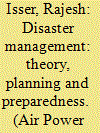

|
|
|
| 20 |
ID:
073835
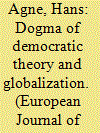

|
|
|
|
|
| Publication |
2006.
|
| Summary/Abstract |
This article examines and questions a principle in democratic theory which has become particularly fashionable in analyses of globalization and European integration, namely that everyone affected by a decision should be able to participate in making it. It is found that this principle is too strong to fit with the meaning of democracy, leads to tautological arguments, is indeterminate in politically important cases and, if its indeterminacy is rectified, fails to support ideas of political equality and accountability. Removing this principle from the concept of democracy implies, among other things, that empirical analysis becomes more significant, indeed necessary, for assessment of effects of globalization on democracy. Parallel to the development of critical arguments is the defence of a theoretical alternative according to which the delimitation of democratic communities should be decided on the grounds of what effect it produces in terms of autonomy for everyone, those included as well as those excluded.
|
|
|
|
|
|
|
|
|
|
|
|
|
|
|
|
|
|
|
|
|